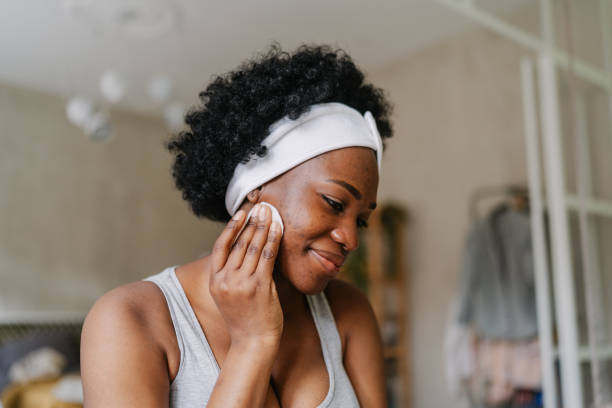
In a perfect world, there would be a one-size-fits-all regimen for controlling acne. But because everyone has unique skin types, lifestyles, and genetics, what may work for one doesn’t always work for the other.
Acne not only affects teenagers, but it also affects adults well into their forties. Acne is typically genetic and if one of your parents had it growing up, the chances of you having it are higher.
According to the American Academy of Dermatology, acne is the most common skin condition in the United States, affecting up to 50 million Americans annually. Acne not only affects how your skin looks, but many of us don’t talk about how it also plays a major role in self-esteem and confidence.
RELATED: Acne vs Eczema: How To Identify, Prevent And Treat
Think about this for a minute. If you woke up every morning with zits all over your face and your parents constantly told you you’d eventually grow out of it, meanwhile, people at school are staring and calling you pizza face, how would that make you feel? One wouldn’t want to live with this as a teen or an adult.
There are several lifestyle changes a person can make to treat their acne and keep it under control, starting with your diet.
One item to eliminate from your diet is dairy. Dairy causes inflammation and mucus in the body. Cow’s milk contains hormones that react with testosterone in your body, causing an increase in oil production, which can clog the pores and worsen your acne.
Sugar is another food item to eliminate from your diet. From acne to wrinkles, sugar is bad for your skin. It’s a refined carbohydrate (white bread, white rice, pastries, soda) that spikes insulin levels leading to inflammation and causing premature aging in the skin.
Now I know this next food will shock you, but peanuts and peanut butter have a lot of fat in them and convert into AA (arachidonic acid), which triggers inflammation as well.
Clearly, these three food groups have something in common. INFLAMMATION. So if you are struggling with acne, it’s a great idea to look at the foods you are eating and eliminate the triggers.
For lifestyle changes, here are a few tips that can help keep your skin clear:
- Clean your cell phone
- Cleanse your skin for 60 seconds
- Wear SPF 30 every day
- Get 6-7 hours of uninterrupted sleep per day
- No scented or fragrance laundry detergents
- Ice your pimples
Dietary Adjustments
- Incorporate Anti-Inflammatory Foods: Add foods rich in omega-3 fatty acids (like salmon, walnuts, and flaxseeds) to help combat inflammation.
- Increase Probiotic Intake: Probiotics found in yogurt (non-dairy), kefir, or supplements can help maintain a healthy gut microbiome, which has been linked to better skin health.
- Stay Hydrated: Drinking plenty of water helps flush toxins from the body and keeps your skin hydrated.
- Reduce Processed Foods: Avoid overly processed snacks and meals that can contribute to inflammation and skin issues.
- Balance Your Diet: Focus on whole grains, lean proteins, and fresh vegetables to provide your skin with essential nutrients.
Skincare Habits
- Double Cleanse at Night: Use an oil-based cleanser followed by a water-based one to thoroughly remove makeup, sunscreen, and impurities.
- Exfoliate Wisely: Use a gentle chemical exfoliant like salicylic acid or glycolic acid once or twice a week to unclog pores. Avoid over-exfoliating, which can worsen acne.
- Moisturize Regularly: Even if your skin is oily, using a non-comedogenic moisturizer prevents your skin from overproducing oil.
- Avoid Touching Your Face: Reduce the transfer of bacteria and oil by keeping your hands off your face during the day.
- Change Pillowcases Frequently: Wash pillowcases at least twice a week to minimize the buildup of oil and bacteria.
Lifestyle Changes
- Practice Stress Management: Stress increases cortisol levels, which can trigger breakouts. Practice mindfulness, yoga, or other stress-relieving activities.
- Get Regular Exercise: Physical activity improves circulation and helps your body flush toxins, but be sure to cleanse your skin immediately after sweating.
- Reduce Alcohol and Smoking: Both can dehydrate your skin and exacerbate acne.
- Maintain a Clean Environment: Regularly clean makeup brushes, bedding, and anything else that comes in contact with your face.
- Limit Screen Time Before Bed: Blue light from screens can disrupt your sleep cycle, which may indirectly affect your skin health.
Advanced Skincare Practices
- Consider Retinoids: Over-the-counter or prescription retinoids can help with cell turnover and prevent clogged pores.
- Spot Treat with Benzoyl Peroxide: Effective for targeting active breakouts, but be careful as it can bleach fabrics.
- Try LED Light Therapy: Blue light kills acne-causing bacteria, while red light reduces inflammation and promotes healing.
- Consult a Dermatologist: For persistent acne, treatments like chemical peels, laser therapy, or prescription medications might be necessary.
Keep in mind acne is not something anyone enjoys having but if you are on the right skincare routine along with a healthy diet and lifestyle, we can control it. If you are struggling with acne, see an Esthetician that can educate you on the type of acne you have to provide a custom treatment for you.









